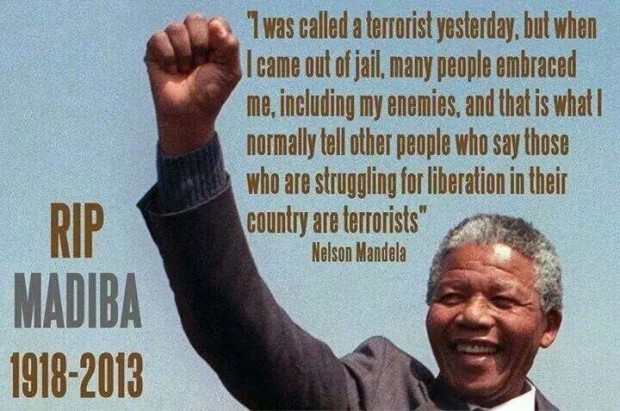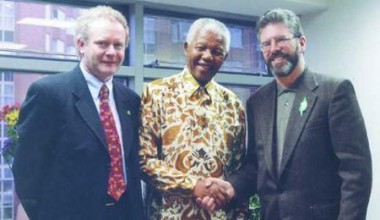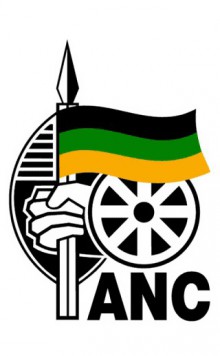6 December 2013
Nelson Mandela, freedom fighter and anti-apartheid icon, RIP

When Nelson Mandela met Gerry Adams in Johannesburg in 2001 – to discuss the South African and Irish peace processes – Madiba paid tribute to the Sinn Féin president as ‘a man who has a place in history’
NELSON MANDELA, the former leader of the African National Congress and President of South Africa who led his country through the nightmare of apartheid and consequent armed struggle to freedom and reconciliation, has died at the age of 95.
‘Madiba’, the clan name by which he is affectionately known amongst South Africa’s 53million people, passed away peacefully in his Johannesburg home. He was being treated for a recurring lung infection
Mandela personified the national liberation struggle of the ANC and he became an icon revered all over the world, in later years even amongst former opponents.
He was jailed by the white supremacist government of South Africa for 27 years, during which time he contracted tuberculosis in the 1980s while being held in jail on Robben Island. Freed from prison in 1990, he was awarded the Nobel Peace Prize in 1993.
Since his release, Mandela was a constant source of advice, encouragement and support to the Irish Peace Process and the many Sinn Féin leaders he met, including Martin McGuinness and Gerry Adams (pictured below).

NELSON MANDELA had held numerous positions in the ANC, including ANC Youth League Secretary (1948); ANC Youth League President (1950); ANC Transvaal President (1952); Deputy National President (1952) and ANC President (1991).
Born at Qunu, near Umtata, on 18 July 1918, in 1944 he helped found the ANC Youth League, whose Programme of Action was adopted by the ANC in 1949.
Mandela was elected National Volunteer-in-Chief of the 1952 Defiance Campaign. He travelled the country, organising resistance to discriminatory legislation.

He was given a suspended sentence for his part in the campaign and, shortly afterwards, a banning order confined him to Johannesburg for six months. During this period he formulated ‘The M Plan’, under which ANC branches were broken down into underground cells.
By 1952, Mandela and Oliver Tambo had opened the first black legal firm in the country and Mandela was both Transvaal President of the ANC and Deputy National President.
In the 1950s, after being forced through constant bannings to resign officially from the ANC, Mandela was one of 156 people arrested and tried for treason in 1956 in a trial that lasted until 1961, when all of the defendants were found not guilty.
When the ANC was banned after the Sharpeville massacre in 1960, he was detained until 1961. He then went underground.
Umkhonto we Sizwe (‘Spear of the Nation’ or MK), the military wing of the ANC, was born the same year. Under Mandela’s leadership it launched a campaign of sabotage against government and economic installations.
In 1962, Mandela left the country for military training in Algeria and to arrange training for other MK members.
On his return he was arrested for leaving the country illegally and for incitement to strike. He conducted his own defence. He was convicted and jailed for five years in November 1962. While serving his sentence, he was charged, in the Rivonia trial, with sabotage and sentenced to life imprisonment.
Robben Island, where he was imprisoned, became a centre for learning and Mandela was a central figure in the organised political education classes.
During the 1970s he refused the offer of a remission of sentence if he recognised the Transkei homeland and settled there.
In the 1980s, he again rejected President PW Botha’s offer of freedom if he renounced violence.
Shortly after his release on Sunday 11 February 1990, Mandela and his delegation agreed to the suspension of armed struggle.
‘Madiba’ was inaugurated as the first democratically-elected State President of South Africa on 10 May 1994 and served until June 1999.
In 2004, he retired from public life.
Below: A mural tribute to Mandela on Belfast's Falls Road

Follow us on Facebook
An Phoblacht on Twitter
Uncomfortable Conversations

An initiative for dialogue
for reconciliation
— — — — — — —
Contributions from key figures in the churches, academia and wider civic society as well as senior republican figures





